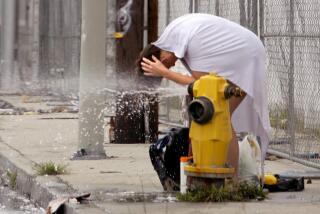Health Network Serves Homeless : Boston: Participating doctors face the paradox of making sick people well and then watching them return to the conditions that made them sick.
- Share via
BOSTON — John Wetmore’s life might seem the stuff of which sad songs or bitter poems are made.
He’s rambled the country since he was 12. A weakness for alcohol has forced him to work odd jobs or live on the street.
But now, he must shoulder his plastic trash bag of clothes and leave the Barbara M. McInnis House, a nursing home converted to treat sick homeless people.
He’s reluctant to hit the road again, even though doctors say his ribs, broken in a drunken fall, have mended.
“Yeah, I guess they spoiled me,” said Wetmore, 37, his scarred face framed by shoulder-length hair and a Colorado Rockies cap. “I’ve been in hotels that are worse. This place is good.”
It’s another day of goodbys at the McInnis House, where three out of four patients head straight back to the streets. It’s also a common moment for Health Care for the Homeless, the program that runs McInnis House.
Tulane University sociologist James Wright has followed Health Care for the Homeless since it began as a national demonstration project in 19 cities eight years ago. Across the country, he said, participating doctors face the paradox of making chronically sick people well and then watching them return to the conditions that made them sick.
The dilemma--how to make sure the unemployed and the unemployable, such as the homeless, receive basic health care--is one of many that President Clinton’s reform plan tries to address.
Overall, Health Care for the Homeless has 129 programs in 49 states (Arkansas has none) that expect to get about $58 million in federal funds this year.
Boston’s $4.5-million program treats 6,000 to 7,000 people each year in about 47,000 visits.
Besides money from the Massachusetts and federal governments, the program receives donations from a host of private foundations.
The program is set up so homeless people can show up at clinics every weekday at Boston City Hospital, or three times a week at Massachusetts General Hospital. In addition, medical teams go out to 42 sites, including homeless shelters.
Gerald, 59 and unemployed, was the first customer on a recent weekday at Dr. Michael Bierer’s clinic at Massachusetts General. Sitting in a chair hugging himself, he waited to hear the results of tests given after a shelter nurse had detected a heart murmur.
When the results showed his condition wasn’t serious, his face wrinkled with a series of smiles.
“You really checked me up good. I appreciate that,” he said.
Bierer and O’Connell say their job is tougher than other doctors’ because few homeless people heed basic advice for good health. Common ailments include liver problems from alcohol abuse and leg ulcers from poor circulation caused by being on their feet all day long.
“If I don’t have a future, does it make sense for me to quit smoking?” Bierer asked. “I’ve learned not to tell anybody how to live their lives.”
More to Read
Sign up for Essential California
The most important California stories and recommendations in your inbox every morning.
You may occasionally receive promotional content from the Los Angeles Times.













